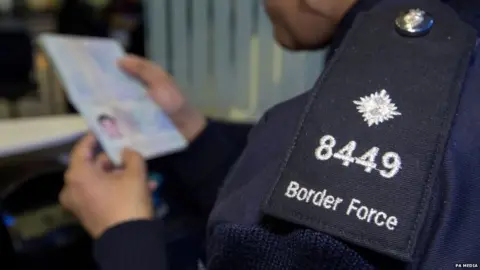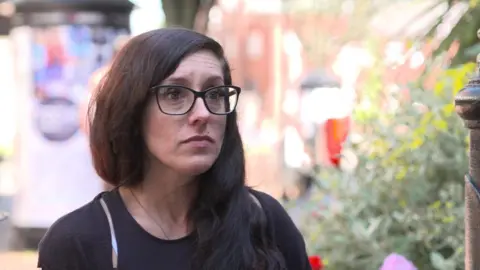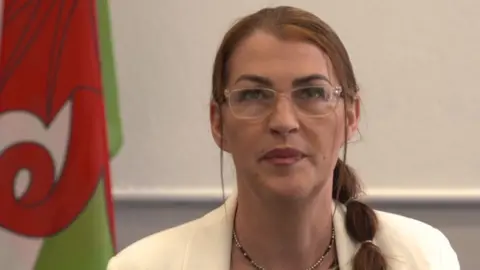Brexit: 'EU citizens in Wales unaware children need to apply to stay'
 PA Media
PA MediaSome EU nationals in Wales may not be aware they need to apply for their children to be allowed to stay in the UK, according to charities.
Organisations which help applicants to the EU Settlement Scheme (EUSS) also said some parents struggled to provide the necessary documents.
The deadline for the EUSS was 30 June, but some applications are still allowed on certain grounds.
A Home Office spokesperson said EUSS had been an "overwhelming success".
The spokesperson added it was "clear that we will take a pragmatic and flexible approach for considering cases with reasonable grounds for missing the deadline".
By 30 June - the scheme's deadline day - 98,600 had applied for the EUSS in Wales. The Home Office is still accepting late applications, and has published a non-exhaustive list of grounds for doing so.
Those grounds include children whose parents or guardian were unaware they should apply on their behalf, individuals with a medical condition which prevented them from applying and those who did not have internet access, or access to relevant documents.
'This is my children's home'

Daria Grzybowska, 35, is a Polish national who has lived in Wrexham for about 10 years.
She has two boys, aged seven and 11, the youngest of which was born in the UK. As a result, she was not initially aware they both needed to apply for the EUSS.
"I found out after I applied for myself that I have to do separately for them too," she said.
"I was surprised because I am a mother and usually when we do something they are straight away with me with every application, or things like that."
Getting the appropriate documentation for one of her boys has also been "very difficult", she said, since she had separated from their father and was not in touch with him.
"I don't know why we have to do this. One of the children was born here and the other has been here since he was one-and-a-half. This is their family home," she said.
She finally turned to Wrexham's Polish Integration Support Centre (PISC), where she was referred to Newport Mind, which is funded to help applicants across Wales.
'People have assumed'
Ms Grzybowska is not alone, according to Mind Newport's Donald Mutale.
"Unfortunately, we are coming across more and more children who may have been born in the UK and don't have a passport or identity document and have struggled to get one because of the pandemic - embassies not being able to offer appointments or the length of the application process to get their first passport from their country of nationality," he explained.
"For children in those circumstances, they are able to make a paper application, however, paper applications take significantly longer than the online applications.
"In addition, we've found that in some cases, EU, EEA and Swiss nationals are unaware that their children need to apply. In some cases, people assume that just because the child was born in the UK, that they are possibly a British national and don't need to apply to the EU Settlement Scheme."
Newport Mind is encouraging EU nationals who have not yet applied, either for themselves or their children, to make a late application and "take this opportunity to protect their rights in the UK".
Other organisations are seeing the same pattern
Kate Smart, CEO of Settled, which also helps EU nationals with the EUSS, said: "Parents are coming to us each day who didn't realise children needed individual applications.
"Some parents have been told they have not provided enough evidence of continuous residency in the UK of very small children before 30 December, but in many cases that is very difficult to prove.
"This may not become a clear issue for many of these families until several years down the line."
'The application isn't easy'

The EUSS is "not as easy as [the Home Office] present or publicise", especially for those with criminal records or a history of homelessness, according to Anna Buckley, of PISC.
She said queries about EUSS applications had put "a massive pressure" on the voluntary organisation.
"For example, since yesterday we've got 700 emails and part of this is [questions about] we where are with the settled status - 'are we allowed to go to the doctor' or 'are we allowed to go abroad?' There's lots of information which wasn't provided as clearly as it should [have been]."
Thousands of others, like Daria Grzybowska, are still waiting to hear whether their application has been successful.
"I'm still waiting. There's so many question I have and nobody can answer me," she said.
A Home Office Spokesperson said that the EUSS "has been an overwhelming success" and that applicants' rights in the UK are protected if they made an application before 30 June.
The Welsh government urged parents to use the services of organisations like Settled, which it has committed to funding for the rest of the year.
